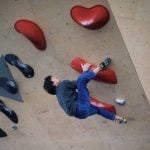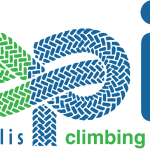
Gross. Filthy. Nasty.
It doesn’t take too much negligence, however inadvertent, before these words can be consciously or subconsciously attached to your gym by members and guests alike. Fortunately, new solutions have recently come to market, with ClimbLab among those leading the charge. With their suite of new products, ClimbLab is changing the way climbing gyms clean holds, filter chalk from the air, and heat and cool their facilities.
Cleanliness is one of the most enduring challenges climbing gyms face. Soft shoe rubber, sweat and endless amounts of chalk are simply hard to control. After all, climbers need chalk, but power washing holds is a tedious and unpleasant job; it can also waste considerable amounts of water, a precious resource that is becoming increasingly more valuable.
Several years ago, two Danish climbers who have been climbing in dirty, dusty gyms since the 90’s finally said to themselves, “There has to be a better way.” (Actually, they probably said, “Der må være en bedre made.”) Morten Pedersen and Jens Gad, climbers and friends who both hold mechanical engineering degrees and have decades of real-world engineering experience, decided to quit their full-time jobs in pursuit of the ultimate solution. The result: ClimbLab.
Air filters with often expensive, wasteful disposable filters, power washers, and hold cleaners that can operate like glorified dish washers do exist, but they believed it could be done better. What ensued was a ground up, first principles approach to solving these problems.
Clean Holds Without the Hassle
ClimbLab’s first product, the Ultrasonic Cleaner, took advantage of Gad’s deep understanding and experience with ultrasonic technology in his former career. The result is a hold washing machine that has zero moving parts (highly reliable), washes holds in baskets as they come straight off the wall, and reduces water consumption (for 40 crates of holds) from about 800 gallons for power washing to a mere 55 gallons―the lowest water consuming hold cleaning solution on the market according to Pedersen and Gad’s aggregation of the data.

In addition, the ClimbLab Ultrasonic Cleaner can reduce the time to clean holds by 75% and dramatically reduce the costly hourly work of sorting holds. Since holds coming off the walls into crates are cleaned and dried in those same crates, the cost associated with paying setters or other staff to sort holds into their colors and families is significantly reduced. Setters have more time to do more enjoyable work they do best―setting routes―and contribute the full value of their labor, rather than sifting and sorting holds.
For those gyms that insist on power washing, ClimbLab built a pressure washer booth with active air filtration that prevents mist from being sprayed onto the user. The spray booth also allows those gyms who currently power wash outside to move those operations indoors, so that the operator is not subject to swings in temperature and weather―all without having to construct a specialized wash room.
Clean Air and Zero Recurring Filter Costs
After addressing inefficiencies and water wastefulness that can come with hold washing, the founders of ClimbLab set their sights on indoor air pollution, which is mostly caused by chalk particulate matter. According to information published by the CWA, 90% of chalk dust falls below 5 microns in size. The EPA states that particles below 10 microns in size are potentially hazardous to human health. Once again, ClimbLab knew things could be done better, which led to the development of ClimbLab E-Air filters.

Unlike traditional air filters that use disposable paper filters, ClimbLab’s bespoke solution electrostatically charges particles to metal filter cassettes which are then removed from the units and simply rinsed off. After drying the filter cassettes, they are reinstalled in the units, resulting in zero recurring filter costs. In contrast to paper filters that typically require a powerful, louder fan to pull air through the filters as they get full of chalk, these cassettes do not experience a pressure drop even when completely full, which can result in dramatically reduced power usage and noise levels.
The average-sized gym can easily spend many thousands of dollars annually replacing paper filters in other units. Not only do ClimbLab’s E-Air filters avoid this costly problem but, as compared to their competition, per the company’s aggregation of the data they:
- Use less power.
- Offer optional carbon filtration to reduce smell.
- Remove 95-98% of particulate matter 1-10 microns in size, which is best in class and 3 times better than what some other chalk removal filters commonly used in climbing gyms are able to remove.
- Run quieter than their competition.
Cool Air That’s Affordable
Lastly, after getting asked by many gyms for fan solutions, the team at ClimbLab developed their own High Volume Low Speed (HVLS) fans.

HVLS fans not only move air but can also provide numerous cost saving and work environment improvements, including:
- Lowering the effective air temperature by as much as 8 degrees, reducing cooling costs by as much as 30%.
- Circulating hot air in cold months away from the ceiling and down to where people are, reducing heating costs by as much as 30%.
- Increasing employee productivity, as employee productivity naturally drops in uncomfortably hot environments. Airflow maximizes the body’s natural means of cooling.
- Providing a comfortable breeze indoors over large areas, with minimal fans. HVLS fans also operate more slowly and are therefore quieter in operation and less intrusive to your business.
For those building new ground-up facilities, ClimbLab regularly works with MEP engineers for solutions that often result in significant HVAC system cost savings.

Now Available in the U.S. and Canada
Although started as a small company in Europe, ClimbLab is having a big impact by offering sustainable, bespoke solutions to the challenges facing modern climbing gyms. Through its partnership with HMH Outdoors, these solutions are now available in the U.S. and Canada and will be displayed at the ClimbLab booth at this year’s CWA Summit in Salt Lake City, May 18th-20th.
ClimbLab’s full suite of products can be viewed at www.climblab.dk.
For more information or sales inquiries, please reach out to sales@hmhoutdoors.com.
For quick questions, we are available by phone anytime at (720) 626-3352.













